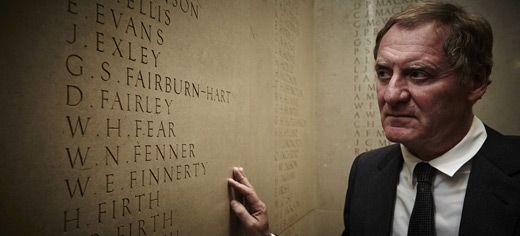
A service of remembrance has been held to rededicate a war memorial 100 years after the start of the First World War.
Former Poet Laureate Sir Andrew Motion read a poem as part of last night’s service at the University of Leeds’ Parkinson Court.
The names of 25 men from Leeds who served in the war have been added to the University’s Brotherton War Memorial. The stories of the men, who all had connections to the University of Leeds, were uncovered by community researcher David Stowe as part of the University’s Legacies of War project.
Following a welcome by Vice-Chancellor Sir Alan Langlands, Sir Andrew read his poem The Death of Harry Patch as part of a service conducted by the University’s Anglican chaplain, the Reverend Matt Ward.
Students read details of some of the fallen, before all 25 names were read out. School of Music fourth year student Will Blackstone then played The Last Post to herald two minutes of silence.
Guests then viewed a new exhibition, University of Leeds: Legacies of the First World War. It tells the stories of some of those commemorated by the memorial, as well as setting out various aspects of life at the University during the conflict. Developments in agriculture, chemistry, textiles, medicine and cultural life are examined, as well as the role of women and the Officer Training Corps (OTC) through the war years.
The exhibition remains open to the public for the next week.
One of the names added to the war memorial is William Skirrow, who was born in Addingham, near Ilkley, in 1894. An electrician and cadet in the University OTC, he enlisted in Leeds and died in April 1918 aged just 24.
A distant cousin, Fraser Skirrow, said he was pleased his relative was being commemorated.
An amateur military historian who lectures regularly on Great War tactics, Mr Skirrow spent hours in the University library researching a book about the war. But he said he was unaware of William Skirrow’s link to the University, until he saw a story about the war memorial rededication on the internet.
The former Territorial Army captain, who leads annual battlefield tours for schoolchildren which take in the Flanders cemetery where his forebear was laid to rest, said: “I was very pleased to hear his name had been added to the memorial.”
Work commitments meant Mr Skirrow, from Surrey, was unable to attend last night’s ceremony.
Sir Alan Langlands said: “The discovery of several missing names has revealed a number of poignant and touching stories that we wish to mark and remember. Rededicating the roll of honour is a fitting way of commemorating these men, the Centenary of the First World War and all those who lost their lives.”
Sir Andrew Motion later took part in a poignant concert in the Clothworkers Centenary Concert Hall on campus. Anthem for Doomed Youth saw him join pianist Ian Buckle for a performance of music and poetry.
Earlier in the day he led a poetry workshop for local A-level students at Leeds Central Library.
Councillor Lucinda Yeadon, Leeds City Council’s executive member for digital and creative technologies, culture and skills, said: “It was a massive honour to welcome Sir Andrew Motion. I really hope having the chance to speak with him about his work will have inspired those young people to follow in his footsteps and make the most of their literary talents.”
Further information
- A look at how the First World War was memorialised is included in a new free online course created by the University of Leeds, in conjunction with the BBC. World War One: Changing Faces of Heroism, a three week course, begins next Monday [27 October]. Visit http://www.leeds.ac.uk/info/125188/online_courses to find out more, view a trailer and sign up.
- Sir Andrew Motion, who was Poet Laureate for ten years from 1999, is President of the Campaign to Protect Rural England and co-founder of The Poetry Archive. His book, The Customs House, is a stunning collection that opens with a sequence of war poems, Laurels and Donkeys, drawing on soldiers' experiences from the First and Second World Wars, through to recent conflicts in Iraq and Afghanistan.
- Ian Buckle is a teacher of piano and an accompanist in the University’s School of Music. He works with several orchestras as a concerto soloist.
- The University of Leeds War Memorial is situated outside the entrance to the Brotherton Library in the iconic Parkinson Building. The memorial was originally installed in November 1951 when the Parkinson Building was opened, and consists of eighteen panels which bear the names of 328 men and officers with connections to the University. Many of the faculties are represented, along with past and present members of the Students' Union, Officers’ Training Corps and Cadet Training School.
- Interviews can be arranged through the University of Leeds press office. Please contact Gareth Dant on 0113 343 3996 or g.j.dant@leeds.ac.uk.